20 microschools making their mark in the United States

Microschools in the United States are gaining recognition as innovative and potentially disruptive models in the education sector. These institutions stand out for their unique educational approaches, typically featuring small, community-based learning environments, a focus on personalized and project-based learning, and closer adult-child relationships. In these settings, teachers often act more as facilitators of student-led learning than as traditional content deliverers.
What are Microschools?
Microschools serve a relatively small number of students, usually ranging from 10 to 15, but sometimes up to 150. This model facilitates more individualized attention and is effective in creating a nurturing and supportive learning environment. The emergence and expansion of many of these schools during the COVID-19 pandemic capitalized on the agility and flexibility that smaller learning communities provide.
Representing a significant shift in educational thinking, microschools emphasize flexibility, personalized learning, and the integration of technology to forge new learning pathways. Their transformative potential lies not only in their size and teaching methods but also in their innovative organizational models, often supported by new technologies. For example, they utilize online instructional materials and course providers to deliver a diverse range of learning experiences without the need for a large staff or extensive facilities. This approach allows microschools to operate on a smaller scale, reducing start-up barriers and facility costs, particularly for those operating without public funding.
In this article, we will explore the top 20 microschools making an impact in the U.S. education landscape. These schools vary in their educational approaches and models but are united in their commitment to reimagining education to better meet the diverse needs and potentials of 21st-century students.
Acton Academy

Acton Academy was launched in Austin, Texas in 2010 by Jeff and Laura Sandefer. Since then, it has expanded to over 270 affiliated academies across 42 states in the United States and 26 countries worldwide. This extensive growth reflects the innovative approach of Acton Academy in redefining education.
Educational Philosophy
Acton Academy's teaching methods emphasize adaptive game-based programs, Socratic discussions, real-world projects, and life-changing apprenticeships. Their approach is learner-driven, focusing on helping students become self-sufficient, resilient, and prepared for the future. This includes fostering independence, self-motivation, and a readiness to pursue individual passions. The school's unique qualities include a learner-driven environment, combining aspects of the Montessori method, project-based learning, and real-world apprenticeships.
What makes Acton Academy stand out
Acton Academy is known for its distinctive educational approach and features that set it apart from traditional schooling systems. Some of the unique features of Acton Academy include:
Learner-Driven Education: Acton Academy emphasizes a self-directed learning approach, where students have significant control over their education. This student-led environment contrasts with traditional classroom experiences focused on lectures and rote memorization.
Adaptive Game-Based Learning: The academy integrates adaptive game-based programs into its curriculum to engage students in core skills development.
Socratic Discussions: Socratic discussions are used to strengthen critical thinking skills, encouraging students to explore and articulate their thoughts more profoundly and reflectively.
Real-World Projects: Hands-on, real-world projects are a significant part of the learning experience at Acton Academy. These projects are designed to provide practical experience and to foster problem-solving and creative thinking skills.
Apprenticeships: Acton Academy provides opportunities for life-changing apprenticeships, allowing students to gain real-world experience in various fields of interest.
Focus on 21st Century Skills: The curriculum is designed to prepare students for a rapidly changing world, emphasizing creativity, collaboration, effective communication, problem-solving, critical thinking, leadership, ethical decision-making, and character development.
Entrepreneurial Mindset: Entrepreneurship is a core component of the academy's philosophy, encouraging students to be proactive, take risks, and learn from failures as part of their educational journey.
Personalized Learning Paths: The academy supports personalized learning paths, allowing students to progress at their own pace and according to their interests and goals.
Community and Peer Engagement: Acton Academy promotes a strong sense of community and peer engagement, with students often working in teams and depending on each other for project success.
Niche Ratings: On Niche, Acton Academy schools generally receive positive ratings. For example, The Forest School: An Acton Academy in Fayetteville, GA, holds a rating of 4.67 out of 5 based on 15 reviews. Acton Academy Silicon Valley in Redwood City, CA, has a perfect score of 5 out of 5 from 6 reviews. Acton Academy Fishers in Fishers, IN, and Acton Academy Lincoln in Lincoln, NE, both also scored 5 out of 5, with 5 and 7 reviews respectively. These ratings indicate a high level of parent and student satisfaction with the Acton Academy's educational model and overall experience.
Wildflower Schools

Wildflower Schools are a network of Montessori schools that have been expanding globally. The original Wildflower Montessori began with the efforts of founder Sep Kamvar and veteran Montessorians Mary Rockett and Katelyn Shore. The schools are located in various places, including Chapel Hill, North Carolina, Goodyear, Arizona, and Washington, D.C., and have an international presence as well. Wildflower Schools are considered one of the best microschools in the U.S. due to their unique approach to education, which blends Montessori methods with a decentralized, community-focused model.
Educational Philosophy
Wildflower Schools employ a Montessori-based approach, characterized by child-led learning and nature-based education. They define curriculum as the intentional design for learning negotiated by students and educators, focusing on student interests, educator provocations, the school environment, and community connections
What makes Wildflower Schools stand out
Decentralized and Teacher-Led Model: Wildflower Schools operate as a network of decentralized Montessori microschools, each led by "teacher-leaders." This model allows for significant autonomy at the school level, empowering teachers to make key decisions and tailor the learning environment to their students' needs.
Montessori Approach with Technological Integration: Wildflower integrates the Montessori educational approach, known for its focus on child-centered learning, with modern technology. They have developed technologies to assist teachers in student observation and simplify administrative tasks, aiming to reduce the time teachers need to spend on non-teaching activities. This unique combination supports a more efficient and effective educational experience.
Commitment to Diversity and Equity: Wildflower Schools strive to create intentionally diverse learning environments, welcoming students from various socio-economic backgrounds. This commitment is aligned with their principle of equity, seeking to provide high-quality education to all children.
Organic Growth Based on Community Demand: The growth of Wildflower Schools is driven organically by the demand from families and teachers, rather than by top-down expansion goals. This approach ensures that new schools are established in response to real community needs and interests.
Sustainable Financial Model: Wildflower Schools employ a braided funding model, combining student tuition fees and childcare subsidies. This model contributes to the financial sustainability of each school, with a long-term vision of self-sustenance through network fees charged to the schools.
Niche Ratings: Wildflower School in Goodyear, AZ, is rated as an above-average public school on Niche. It has an overall Niche grade of B+ and is particularly noted for its diversity (A grade) and quality of teachers (B+ grade). The school serves grades PK to 8, with a student-teacher ratio of 19 to 1. According to state test scores, 45% of students are proficient in math and 54% in reading. Additionally, it ranks 4th among Niche Standout Middle Schools in the Phoenix Area, 12th in Niche Standout Middle Schools in Arizona, and 19th in Niche Standout Elementary Schools in Arizona
Expanding Network with Supportive Infrastructure: Since its founding, Wildflower has experienced significant growth, expanding its network while developing infrastructure for training, coaching, and administrative support. This expansion demonstrates the effectiveness and appeal of their educational model.
Prenda
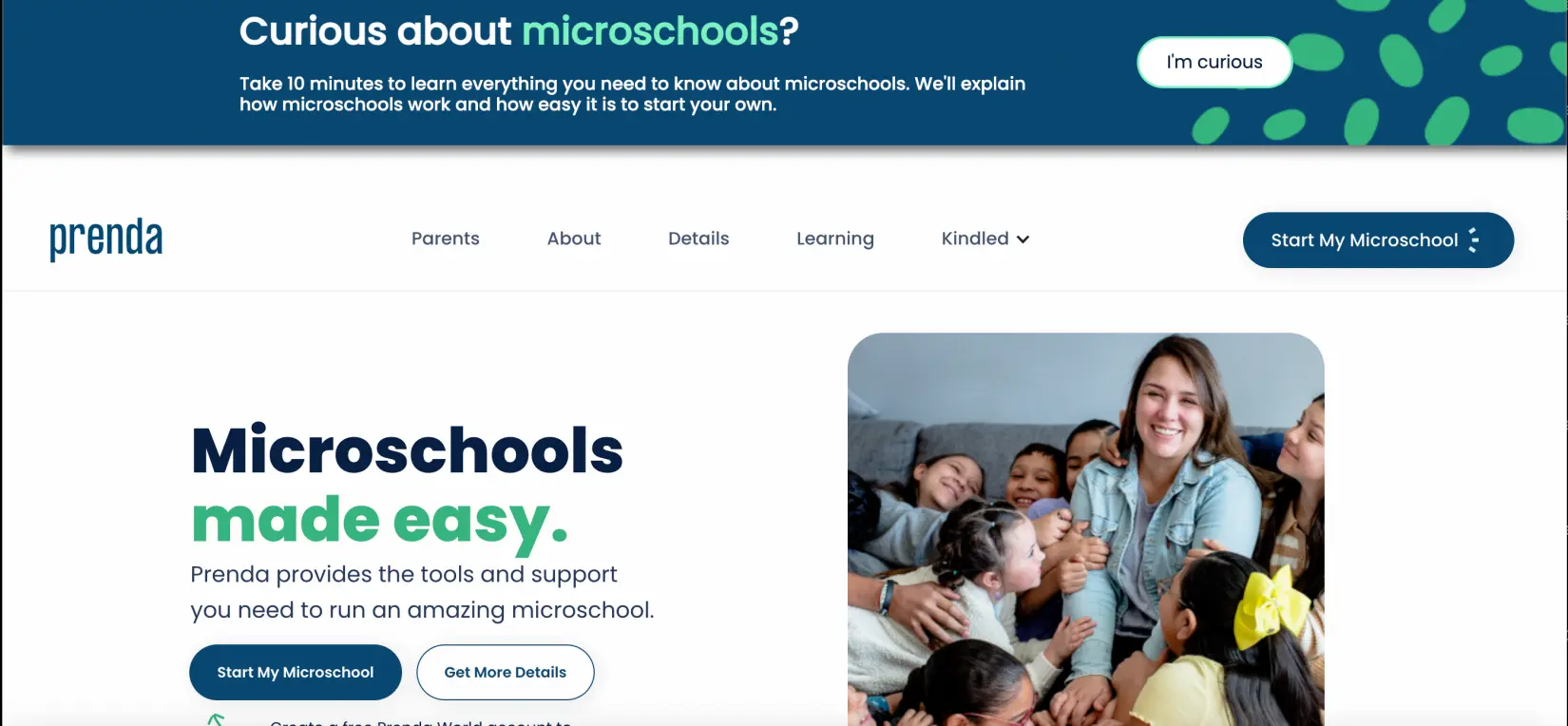
Kelly Smith started Prenda in 2018 and has expanded rapidly across the United States. While it began in Arizona, it now supports microschools in multiple states, to make its model accessible nationwide. Prenda has helped more than 1,000 microschool founders and 10,000 K-8 students across the US.
Educational Philosophy
Microschool Model: Prenda operates small, informal learning groups of up to 10 students, emphasizing a personalized learning experience.
Student Autonomy: The educational approach is centered on student-driven learning, where students take ownership of their educational journey.
Learning Guides: Instead of traditional teachers, Prenda utilizes "learning guides" to facilitate and support the learning process.
Project-Based and Mastery-Focused Learning: The curriculum is designed around project-based activities and mastery-focused progression, allowing students to learn at their own pace.
What makes Prenda stand out
Microschool Model: Prenda operates microschools, which are small, informal learning groups of up to 10 children. This model offers a more personalized and tailored educational experience compared to traditional classroom settings.
Learning Guides Instead of Traditional Teachers: In Prenda microschools, adults are referred to as "learning guides" rather than teachers. These guides are not necessarily certified teachers but are individuals deeply invested in their communities and in empowering children's education. Their role is to facilitate and support the learning process rather than directly transmitting information.
Empowering Student Autonomy: Prenda emphasizes student autonomy, allowing children to take ownership of their education. This approach is based on the belief that children are more motivated to learn when they have control over their learning process.
Combination of Public School and Homeschool Benefits: Prenda's model is seen as a blend of the social interaction found in traditional public schools and the individualized, personalized aspect of homeschooling.
Project-Based and Mastery-Focused Learning: The curriculum in Prenda microschools is mastery-focused and project-based, helping students to engage deeply with the material and learn at their own pace.
Use of Technology for Core Academic Learning: By integrating technology, Prenda allows guides to focus more on the social aspects of learning, such as building connections and providing emotional support to students.
Accessible Across the Country: Prenda has expanded its reach, aiming to make microschools accessible to every child in America. They provide a complete learning model that includes essential subjects like English, math, science, and social studies.
Financial and Academic Support for Parents and Guides: Prenda assists in navigating the financial aspects of running a microschool and helps parents utilize available educational funds. They also provide academic resources and support to guides.
Khan Lab School

Khan Lab School, founded in 2014 by Sal Khan of Khan Academy, is located in Silicon Valley with campuses in Palo Alto (Grades K-6) and Mountain View (Grades 7-12), California. This non-profit, mastery-based school stands out for several reasons.The school focuses on mixed-age learning, emphasizing mastery over seat time, deep project-based learning, and developing a strong sense of student agency. Khan Lab School represents an innovative approach to education, combining personalized learning with a commitment to research and educational innovation.
Educational Philosophy
Mastery-Inspired Approach: The school uses a mastery-based learning model, focusing on understanding and proficiency rather than traditional letter grades.
Project-Based Learning: Projects are a significant part of the curriculum, allowing students to engage in hands-on, experiential learning.
Student-Centered Learning: The teaching and learning processes at Khan Lab School are centered around the students, encouraging them to take responsibility for their own learning and adopt an active stance towards their education.
Faculty-Guides: Instead of traditional teaching methods, the school uses faculty-guides that focus on motivating students and guiding them through experiential learning. They facilitate student independence and do not rely on lectures.
What makes Khan Lab Schools stand out
Educational Approach: Khan Lab School departs from traditional grade levels and grading systems, focusing instead on a mastery-inspired and project-based approach. This method encourages students to take responsibility for their learning, pursue projects aligned with their interests, and achieve meaningful learning goals.
Student-Centered Learning: The school emphasizes student-centered teaching and learning processes. Faculty guides focus on motivating students, guiding them through experiential learning, and creating conditions for student independence. This approach fosters student growth in a dynamic and innovative learning environment.
Class Size and School Hours: Khan Lab School typically has a class size of 15 students and operates for 10 hours each day, providing an extended learning environment.
Niche Ratings: On Niche, Khan Lab School is highly rated, with notable rankings such as being 15th for Best High Schools for the Arts in California, 16th for Best Private K-12 Schools in California, and 22nd for Best High Schools for STEM in California. It has an overall rating of 4.83 out of 5 based on 30 reviews. The average SAT score reported by Niche users from this school is 1470. The school boasts a 100% graduation rate, reflecting its effectiveness in academic preparation.
Parent and Student Testimonials: Parents and students have expressed high satisfaction with the school's focus on mastery-based learning, the collaborative learning environment, and the small school community. The school's approach to education has been well-received, with parents appreciating the balance of focused learning and a strong community spirit.
QuantumCamp

QuantumCamp, founded in 2009 in Berkeley, California, is indeed recognized as one of the early microschools in the United States. QuantumCamp stands out for its innovative approach to science and math education. It was founded with the unique aim of making complex topics like quantum physics accessible to young learners. This microschool is known for its hands-on, activity-based curriculum designed for students from 1st to 8th grade. QuantumCamp distinguishes itself by offering a comprehensive, engaging program that encourages deep understanding and curiosity in STEM fields, making it a noteworthy choice among micro-schools in the U.S.
Educational Philosophy
QuantumCamp's educational philosophy and teaching method emphasize hands-on, activity-based learning, particularly in the fields of science and mathematics. The approach is designed to make complex scientific concepts accessible and engaging for students, fostering a deep understanding and curiosity in STEM subjects. This method involves students actively participating in experiments and projects, which helps to solidify their understanding of theoretical concepts through practical application. The curriculum is tailored to encourage exploration and discovery, allowing students to engage with and understand advanced topics in a supportive, stimulating environment.
What makes QuantumCamp stand out
Innovative STEM Curriculum: They focus on making complex topics like quantum physics accessible to young students, emphasizing hands-on, activity-based learning.
Experiential Learning: The school offers a hands-on approach that encourages students to actively engage with scientific concepts, fostering deeper understanding.
Tailored to Young Learners: Designed for 1st to 8th graders, the curriculum is crafted to spark curiosity and excitement in STEM subjects among younger students.
Small Class Sizes: This allows for more personalized attention and a deeper exploration of subjects.
Integration of Advanced Topics: Uniquely introduces advanced scientific and mathematical concepts at an early age, preparing students for future academic endeavors in these fields.
MYSA Microschool
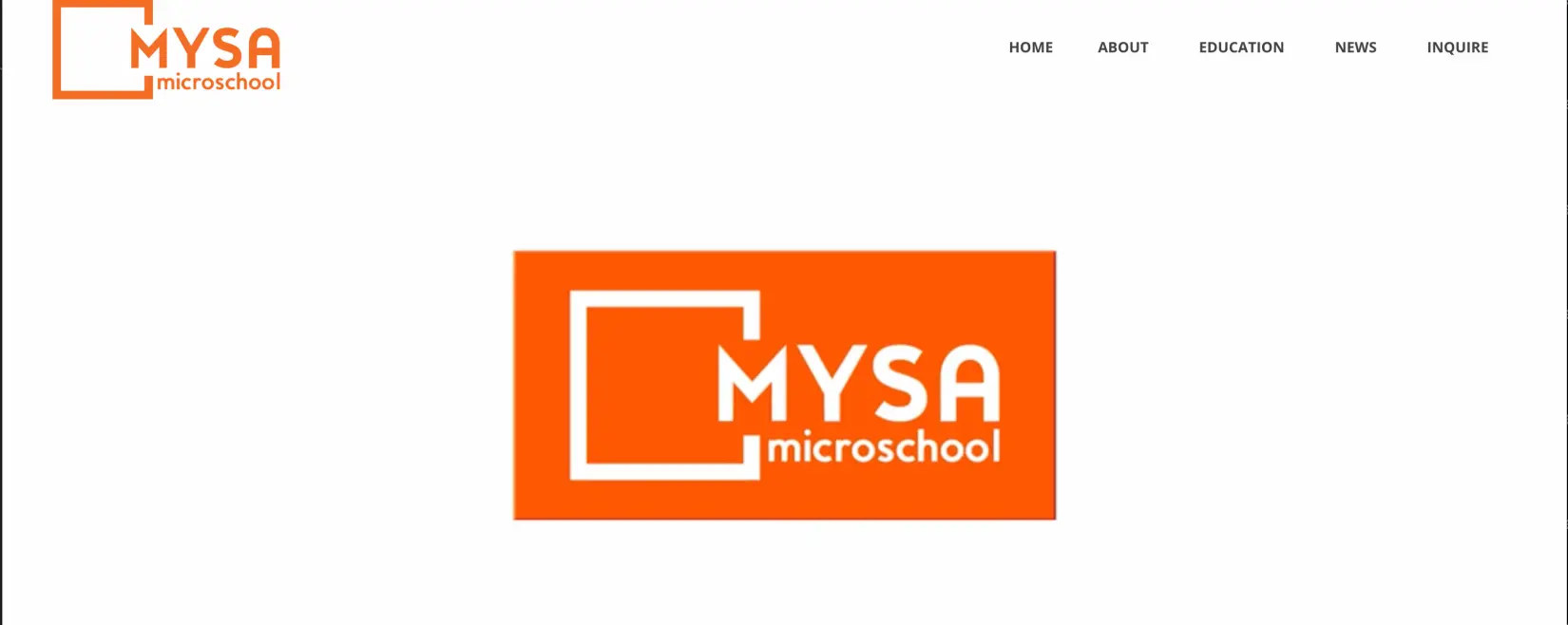
MYSA School, located in Washington DC and Vermont, is distinguished as a leading microschool in the U.S. due to its unique blend of individualized, mastery-based, and experiential learning. It combines hands-on, project-based, interdisciplinary cooperative learning with customized online academic resources. This hybrid educational model offers a balance between a tight-knit, small learning community and access to a global array of academic lessons and programs, tailored to each student's needs
Educational Philosophy
MYSA School's educational philosophy combines individualized, mastery-based learning with experiential methods. It focuses on providing a personalized learning experience through a blend of hands-on, project-based activities and online academic resources. The approach emphasizes customization, collaboration, and curiosity, catering to each student's unique needs and interests. This philosophy aims to create a holistic educational experience that fosters intellectual growth and practical skill development in real-world contexts.
What makes MYSA Microschool stand out
Hybrid Educational Model: Combines hands-on, project-based learning with customized online resources.
Personalized Learning Experience: Tailors lessons to each student's interests and aptitudes, using a weekly menu system.
Real-World Projects: Focuses on solving real-world problems, and enhancing practical learning.
Place-Based Learning: Utilizes local resources and community partnerships for education.
Small and Supportive Environment: Emphasizes a cozy, safe, and connected learning setting.
One Stone
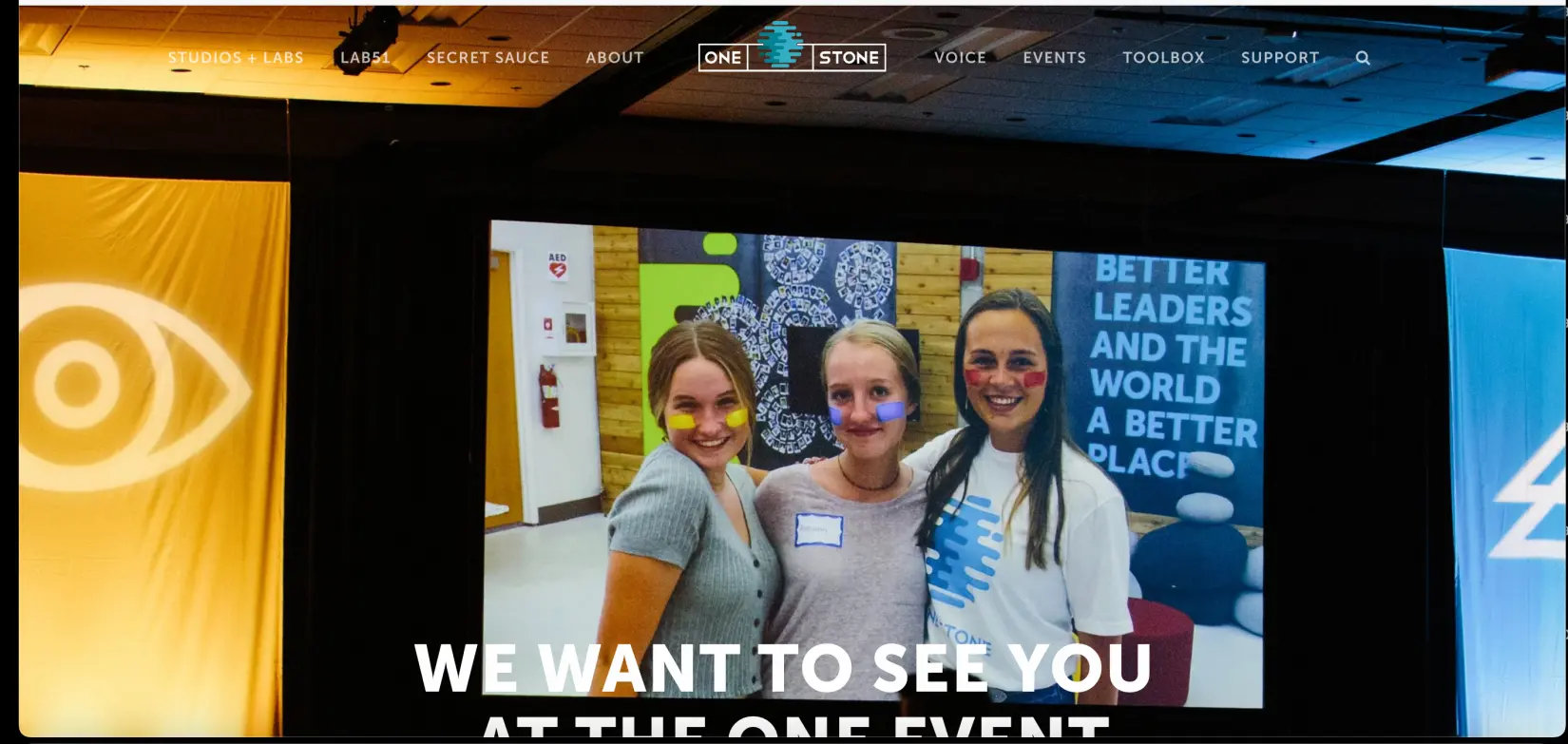
One Stone Microschool, an innovative educational model, was launched in 2008 by Joel and Teresa Poppen. It stands out for its unique student-led and directed culture, which is rooted in empathy and powered by design thinking. This approach allows One Stone to offer a distinctive educational experience that reimagines learning.
Educational Philosophy
One Stone's teaching philosophy centers around allowing students to explore their curiosities and passions, thereby creating interdisciplinary learning experiences. This approach fosters creativity, collaboration, ownership, and entrepreneurship. The school's mission is to make students better leaders and to make the world a better place, emphasizing service, innovative initiatives, and social entrepreneurship.
What makes One Stone Microschool stand out
The microschool has various unique features and stands out in several ways:
It employs a human-centered design process, including steps like noticing, activating, empathizing, understanding, defining, ideating, prototyping, testing, disrupting for good, and evaluating.
The learning method at One Stone is based on immersions, where students engage deeply in a subject or project for an extended period. This method offers a more impactful and personalized learning experience.
Immersions cover a wide range of subjects and activities, such as 3D video game programming, exploring American history through the movie Forrest Gump, musical performances, operating an in-house creative agency, astronomy, and even delving into the complex issue of mining in Idaho.
Alyssum Montessori School
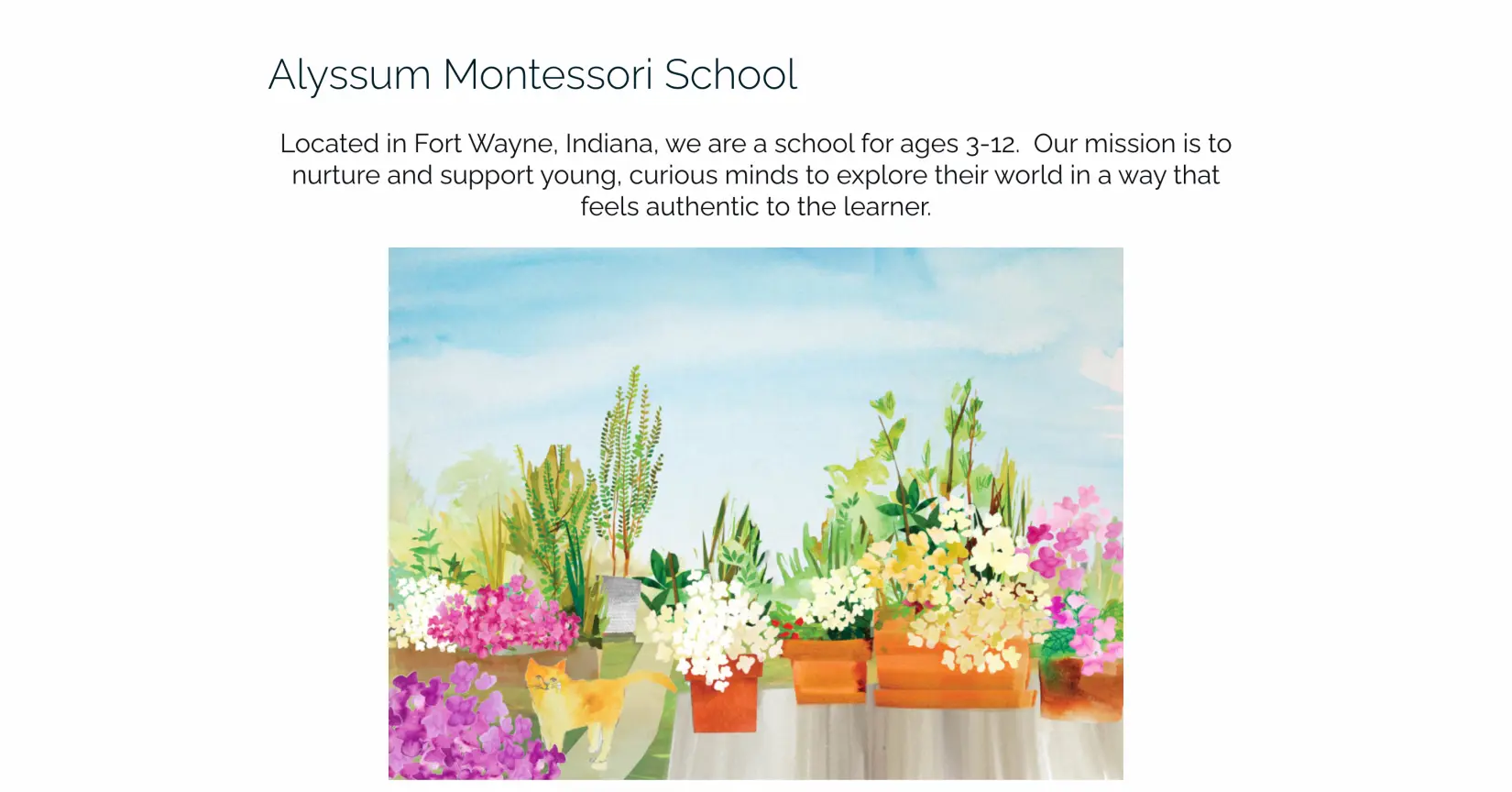
Alyssum Montessori School, located in Fort Wayne, Indiana, is a part of the Wildflower Schools Network. It caters to children aged 3-12 and follows the Montessori philosophy. The school aims to nurture and support young minds in exploring their world in a way that feels authentic to them. Alyssum Montessori School emphasizes a connection between home, neighborhoods, and the greater community, modeling peace and collaboration. It offers a small school environment in a vibrant city, providing a unique educational experience rooted in Montessori principles.
Educational Philosophy
Alyssum Montessori School's educational philosophy is grounded in the Montessori method, which is student-centered and encourages children to follow their interests. The school aims to support and nurture curious minds, emphasizing learning that feels authentic to each student. The approach focuses on ensuring mastery of core subjects while also fostering social and emotional development. The school provides a small, community-oriented learning environment that integrates the home, neighborhood, and wider community, promoting values of peace and collaboration
What makes Alyssum Montessori School stand out
Member of Wildflower Schools Network: Affiliation with this innovative educational network highlights a commitment to Montessori principles and community integration.
Montessori Philosophy: Emphasizes student-led learning, allowing children to follow their interests and develop at their own pace.
Community Integration: Focuses on connecting the school with home and neighborhood, fostering a sense of belonging and collaboration.
Small School Environment: Offers a more intimate learning setting in Fort Wayne, Indiana, enhancing personalized attention and community feeling.
Emphasis on Social and Emotional Development: Alongside academic mastery, there's a strong focus on nurturing students' social skills and emotional intelligence.
Akshaj Versatile Masters' Virtual School AVM
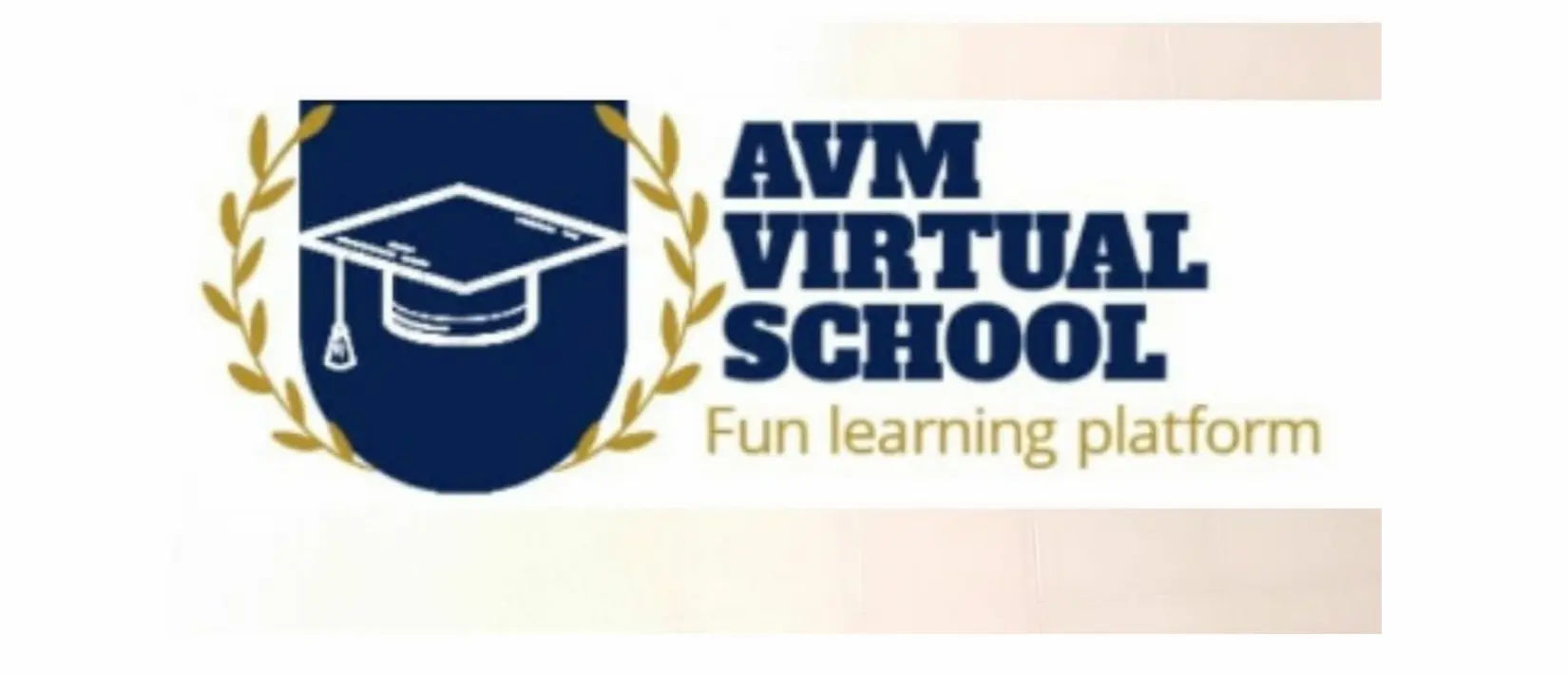
Akshaj Versatile Masters' Virtual School, commonly known as AVM Virtual School, offers online sessions for students ranging from Grades 1-12 across various subjects, including IELTS coaching and hobby classes like cooking, arts and crafts, and public speaking. The school focuses on understanding each student's psychology and teaching them according to their level and needs. This approach helps students recognize their abilities, reduces conflicts with parents, and assists in achieving their life goals. AVM Virtual School aims to be both a mentor and friend to its students, guiding them towards successful careers.
Educational Philosophy
The educational philosophy of Akshaj Versatile Masters' Virtual School focuses on personalized teaching tailored to each student's psychological profile, abilities, and needs. This approach is designed to help students realize their potential, minimize conflicts with parents, and achieve their life goals. The school's commitment is to serve as both mentors and friends to guide students toward a successful career path. This philosophy underlines the importance of adapting teaching methods to individual student circumstances for effective learning outcomes.
What makes AVM stand out
Akshaj Versatile Masters' Virtual School (AVM Virtual School) stands out for several unique features:
Online Education for Grades 1-12: Offers a wide range of subjects through online sessions for a broad age group.
IELTS Coaching: Provides specialized training for both academic and general IELTS exams.
Hobby Classes: Includes diverse extracurricular activities like cooking, arts and crafts, and public speaking.
Personalized Teaching Approach: Focuses on understanding each student’s psychology for tailored teaching.
Global Reach: As a virtual school, it caters to students across different geographic locations.
The Forest School
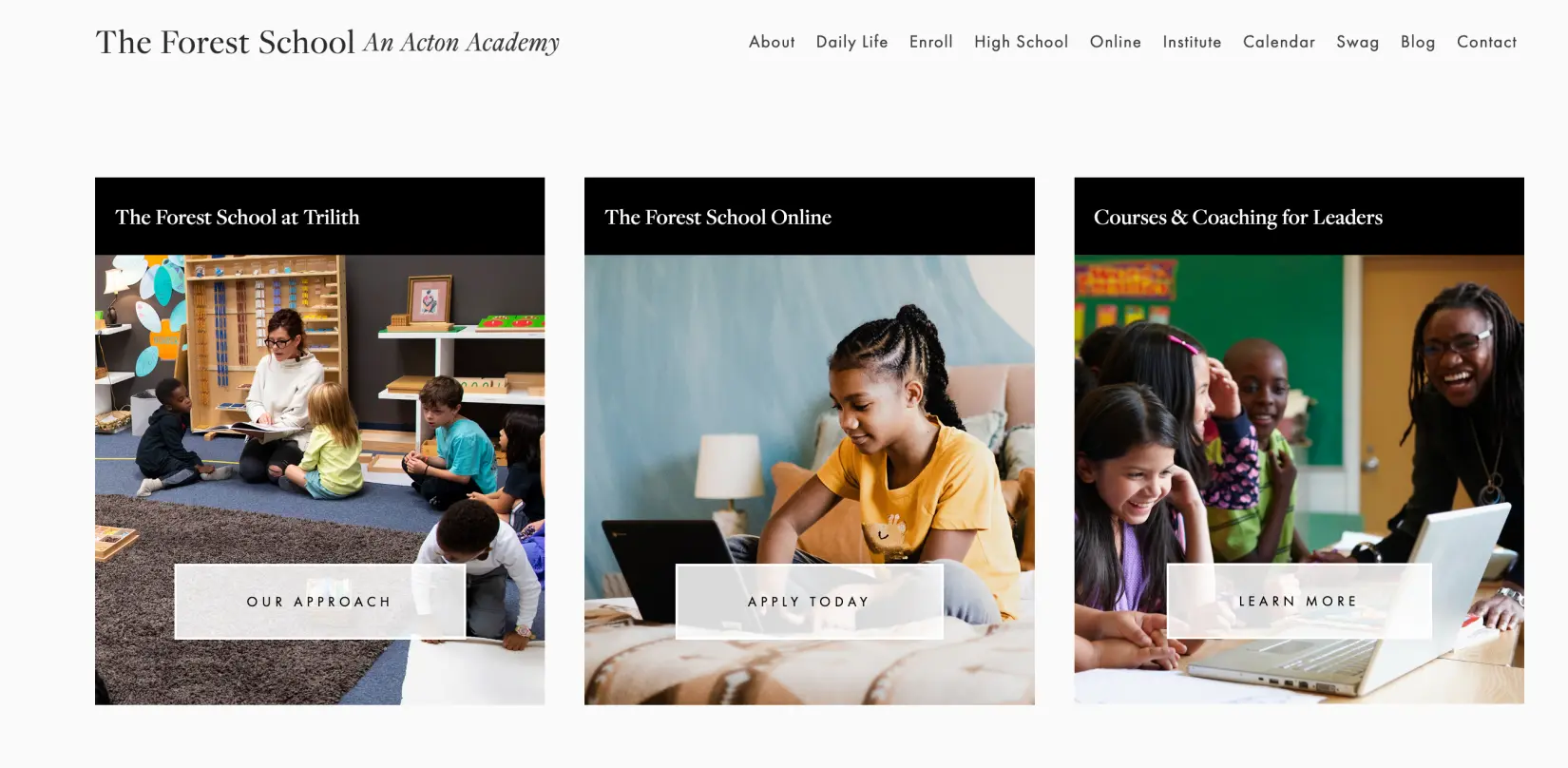
The Forest School is part of the Acton Academy network, a microschool that offers a unique learner-driven education. This school emphasizes student autonomy, project-based learning, and real-world skill development. It focuses on encouraging children to explore, take on challenges, and learn through hands-on experiences. The Forest School's approach is designed to foster creativity, critical thinking, and a love for lifelong learning in a natural, supportive environment.
Educational Philosophy
The Forest School's educational philosophy is rooted in the learner-driven model, emphasizing student autonomy and hands-on learning experiences. This approach fosters creativity, critical thinking, and a lifelong love for learning. The school focuses on project-based learning and real-world skill development in a natural and supportive environment. The aim is to encourage students to explore, take on challenges, and learn through active engagement and discovery.
What makes The Forest School stand out
Emphasis on Self-Directed Learning: Students have significant autonomy in their learning journey, fostering independence and responsibility.
Project-Based Learning: Focus on hands-on projects that integrate real-world skills and academic learning.
Mixed-Age Classrooms: Encourages collaboration and peer learning among students of different ages.
Nature-Integrated Education: Utilizes outdoor environments for experiential learning, promoting a connection with nature.
Socratic Method: Uses guided inquiry for deeper understanding and critical thinking.
Hope United Academy

Hope United Academy is a Christian microschool located in Madison, Alabama. It focuses on serving middle and high school students who may not thrive in traditional educational environments, especially those with ADHD, ADD, executive functioning deficits, dyslexia, and other learning differences. The school adopts a Christ-centered approach and maintains a low student-to-teacher ratio, typically around 4:1. Their curriculum is tailored to individual student needs, incorporating multisensory techniques and project-based learning. The environment at Hope United Academy is designed to foster a love of learning and provide innovative solutions for academic success.
Educational Philosophy
The school's approach is Christ-centered, focusing on individualized instruction that caters to each student's unique learning style. With an average student-to-teacher ratio of 4:1, Hope United Academy offers a tailored pace and format of teaching, aiming to empower students to achieve academic excellence without frustration. The curriculum includes a variety of activities, honors-level classes, and project-based learning, all chosen based on student needs.
Hope United Academy emphasizes a positive and encouraging environment. Daily student accountability and organizational skills are implemented to foster long-term success. They also focus on cultivating leadership skills and provide college-preparatory instruction and dual enrollment opportunities.
What makes Hope United Academy Microschool stand out
Hope United Academy stands out for several reasons, particularly for its unique approach to education tailored to students who might not flourish in conventional school settings. Here are some key aspects that make it distinctive:
1. Focus on Individual Learning Styles: The academy offers individualized instruction, recognizing that every student has a unique learning style. This is particularly beneficial for students with learning differences like ADHD, ADD, dyslexia, and executive functioning deficits.
2. Small Class Sizes: With an average student-to-teacher ratio of 4:1, the school ensures personalized attention and support for each student, a feature that is not commonly found in traditional schools.
3. Christ-Centered Approach: The school integrates a Christ-centered perspective in its curriculum and overall environment. This religious foundation provides a moral and ethical framework for students' development.
4. Specialized Curriculum: The curriculum is tailored to meet the specific needs of each student, including the use of multisensory techniques and project-based learning. This approach is designed to help students with different learning styles and needs to thrive academically.
5. Emphasis on Overall Development: Apart from academic excellence, the school also focuses on character development, leadership skills, and preparing students for college and future careers. This holistic approach is geared towards not only academic success but also personal growth.
6. Positive and Supportive Environment: The academy fosters a positive and encouraging atmosphere where students and teachers support one another. This includes practices like daily chapel and student-led activities that reinforce positive values.
7. Parental Involvement and Partnership: There is a strong emphasis on partnering with parents in their children's education, ensuring that the learning process is collaborative and supportive of the family's needs and goals.
8. Flexibility and Accessibility: The school offers an abbreviated school day to maximize concentration and learning effectiveness, recognizing that traditional school hours may not be optimal for all students.
9. Community and Peer Support: By creating a community-like environment, students are encouraged to support and learn from each other, fostering a sense of belonging and mutual respect.
10. Positive Feedback from Parents and Students: Testimonials from parents and students suggest that the school has had a significant positive impact on students' academic performance and self-confidence.
Primer Microschool

Primer microschools are currently located in various regions within South Florida, North Florida, and Phoenix. Specifically, in South Florida, they have campuses in Coconut Grove, Liberty City, Kendall, and the Miami Health District. In North Florida, a campus is starting soon in Jacksonville, while in the Phoenix area, campuses are opening in Scottsdale and South Tempe. These schools offer personalized, world-class education for grades K-8 and are actively enrolling students.
Educational Philosophy
Primer microschool's educational philosophy centers on personalizing learning to each student's pace, interests, and learning style. They aim to foster a love for learning, critical thinking, collaboration, and individual growth in small, community-driven environments. Primer believes in empowering students as independent learners, nurturing a strong sense of purpose, and developing self-regulation and metacognitive skills. Their approach emphasizes creativity, flexibility, and hands-on experiences, with an innovative teaching style designed to engage and inspire students.
What makes Primer Microschool stand out
1. Personalized Learning: Primer emphasizes individualized learning where students can progress at their own pace. This approach ensures that no student is left behind or held back in their learning journey. Each student receives targeted lessons that are precisely suited to their level, allowing them to master each concept thoroughly.
2. Focus on Passion Projects: A significant part of the Primer experience is dedicated to "Pursuits" — focused time each afternoon where students work on projects that align with their interests and passions. This could range from writing a book or starting a business to researching topics they are curious about. This approach connects core academics to students' passions and promotes skills like creativity, critical thinking, and problem-solving
3. Small, Student-Centered Communities: Primer schools are designed to be small and focused on student needs. This setting allows for more one-on-one support from teachers and encourages students to explore their interests deeply. The small class sizes facilitate a strong sense of community and personalized attention.
4. Holistic Curriculum Approach: Their curriculum goes beyond traditional academics, incorporating critical thinking, problem-solving, and creativity. The school's curriculum is designed to exceed state standards while meeting students where they are, helping them develop a genuine passion for learning.
5. Innovative Instructional Methods: Students engage with a technology-enabled curriculum and have access to laptops for individual learning. The instruction is not solely computer-based; it includes a variety of methods to demonstrate knowledge. Primer also focuses on project-based learning, which allows students to apply their strengths and talents in unique ways.
6. Emphasis on Social-Emotional Learning: Each day begins with activities like yoga and mindfulness, aimed at developing life skills and a positive mindset. Students also engage in goal setting and social-emotional learning throughout the day, fostering a deeper understanding of themselves and their educational journey.
7. Parent Involvement: Primer facilitates greater involvement of parents in their child's education. The microschool setting allows parents to be more informed about their child's day-to-day learning and progress, enabling a more collaborative educational experience
8. Flexibility in Scheduling and Breaks: Primer offers a flexible schedule, allowing breaks as needed based on student needs. This approach provides a learning environment closer to homeschooling, where students can take breaks to avoid feeling overwhelmed and enjoy unstructured socialization time.
9. Minimal Focus on Standardized Testing and Homework: Primer is not a proponent of excessive testing and homework. They conduct a few norm-referenced assessments each year but focus primarily on fostering curious, independent learners rather than teaching to tests. Homework at Primer is minimal, with an emphasis on allowing students to engage in activities outside of school that foster their growth and interests.
Global Village School (GVS)

Global Village School (GVS), founded in 1999, is an accredited international homeschool/private school hybrid known for its unique approach to education. It emphasizes peace, justice, diversity, and sustainability, setting it apart from conventional educational models. The school's philosophy is grounded in meeting students where they are and empowering them to care for themselves, their communities, and the planet. Core academic skills, self-knowledge, and global citizenship are central to GVS's curriculum, with each child authoring their own learning journey based on individual passions, interests, and skills.
Educational Philosophy
GVS's approach is personalized and nurturing, aiming to support creativity and connection. The school has a proven track record of supporting homeschooling families for over two decades and is accredited by the Western Association of Schools and Colleges (WASC). The school caters to a diverse international community, enrolling families from numerous states and countries.
The curriculum of GVS, while promoting an enlightened connection to the wider world, lacks detailed instructional guidance, making it more suitable for families comfortable with unschooling or those looking for a departure from traditional public school models. The curriculum guides provided are more of a framework than a comprehensive plan, requiring additional research and customization from parents.
What makes Global Village School (GVS) stand out
Global Village School (GVS) is notable for its distinct approach to education, particularly in the context of homeschooling and private schooling. Here are some key features that set it apart:
1. Individualized Learning Path: GVS emphasizes meeting each student at their current level and adjusting the teaching approach to meet their individual needs. This personalized approach allows each child to be the author of their own learning journey, setting paths based on their passions, interests, and skills.
2. Holistic Educational Experience: The school’s mission is to create a vibrant, diverse culture where education is not just about academic skills but also about self-knowledge and global citizenship. This holistic approach aims to nurture students who are not only academically proficient but also globally aware and responsible.
3. Emphasis on Core Values: GVS values connection, relationship, compassion, and respect. It aims to support families in raising global citizens who understand their interconnectedness with the rest of the planet and are inspired to contribute positively to the global community.
4. Diversity and Inclusivity: The school caters to a diverse range of students, including those with learning and life challenges, such as ADD, ADHD, and dyslexia. It also supports students who are highly creative, academically advanced or have various other personality traits.
5. Flexibility in Curriculum: GVS provides a flexible curriculum that can be customized to each student's unique needs and interests. This includes a focus on creativity and connection, offering a nurturing environment that fosters a love of learning.
6. Accredited Program: The school has been supporting homeschooling families since 1999 and is accredited by the Western Association of Schools and Colleges (WASC). This accreditation signifies that it maintains a high standard of education.
7. Global Community: GVS serves an international community, having worked with families in numerous states and countries. This global presence underlines its commitment to fostering a sense of global awareness and citizenship among its students.
8. Feedback from Students and Parents: Testimonials from students and parents reflect positive experiences with GVS's curriculum. Students often express that they have gained more than just academic knowledge, including personal growth and a deeper understanding of themselves and the world.
Colossal Academy

Colossal Academy, located in Fort Lauderdale, Florida, is a progressive microschool catering to tweens and teens, particularly those between the ages of 10 and 14. It offers a unique educational approach, combining traditional academic learning with hands-on, experiential activities. The Academy's program includes two days of virtual work, partnering with Florida Virtual School and offering its own online curriculum, complemented by three days of hands-on learning. This hands-on learning takes place in various environments, such as farms, beaches, or skate parks.
Educational Philosophy
One Stone's teaching philosophy centers around allowing students to explore their curiosities and passions, thereby creating interdisciplinary learning experiences. This approach fosters creativity, collaboration, ownership, and entrepreneurship. The school's mission is to make students better leaders and to make the world a better place, emphasizing service, innovative initiatives, and social entrepreneurship.
What makes Colossal Academy stand out
Unique Educational Approach: Colossal Academy combines traditional academic learning with practical, hands-on experiences. This includes a blend of online curriculum and in-person, experiential learning activities.
Focus on Agriculture and Technology: A significant aspect of their curriculum involves teaching students about farming and technology. This unique combination aims to prepare students for future challenges by integrating essential life skills with modern technological knowledge.
Hands-On Learning Environments: The school uses a variety of dynamic learning environments, such as farms, beaches, and skate parks, to provide real-world experiences. These settings help students apply their academic knowledge in practical contexts, fostering deeper understanding and engagement.
Small Class Size and Personalized Attention: With its small class size, Colossal Academy offers a more personalized and intimate learning experience. This allows for individualized attention to each student's unique strengths and needs.
Diverse Range of Skills: Students at Colossal Academy engage in a broad array of activities, from farming and cooking to surfing and skateboarding. These activities are designed not only to teach practical life skills but also to nurture mindfulness and holistic well-being.
Academic Growth and Development: Students have shown significant academic progress, often advancing multiple grade levels in their achievement scores. This growth is attributed to the Academy's comprehensive approach that balances curriculum rigor with life skills.
Inclusive and Progressive Environment: The Academy is committed to inclusion, welcoming students of all religions, races, genders, orientations, and abilities. This inclusive approach underlines its commitment to fostering a diverse and accepting learning community.
Recognition and Support: Colossal Academy's innovative approach has been recognized through grants and awards, such as the VELA Education Fund Next Step Grant. This support underscores the effectiveness and potential of their educational model.
Freestyle Learning Microschool
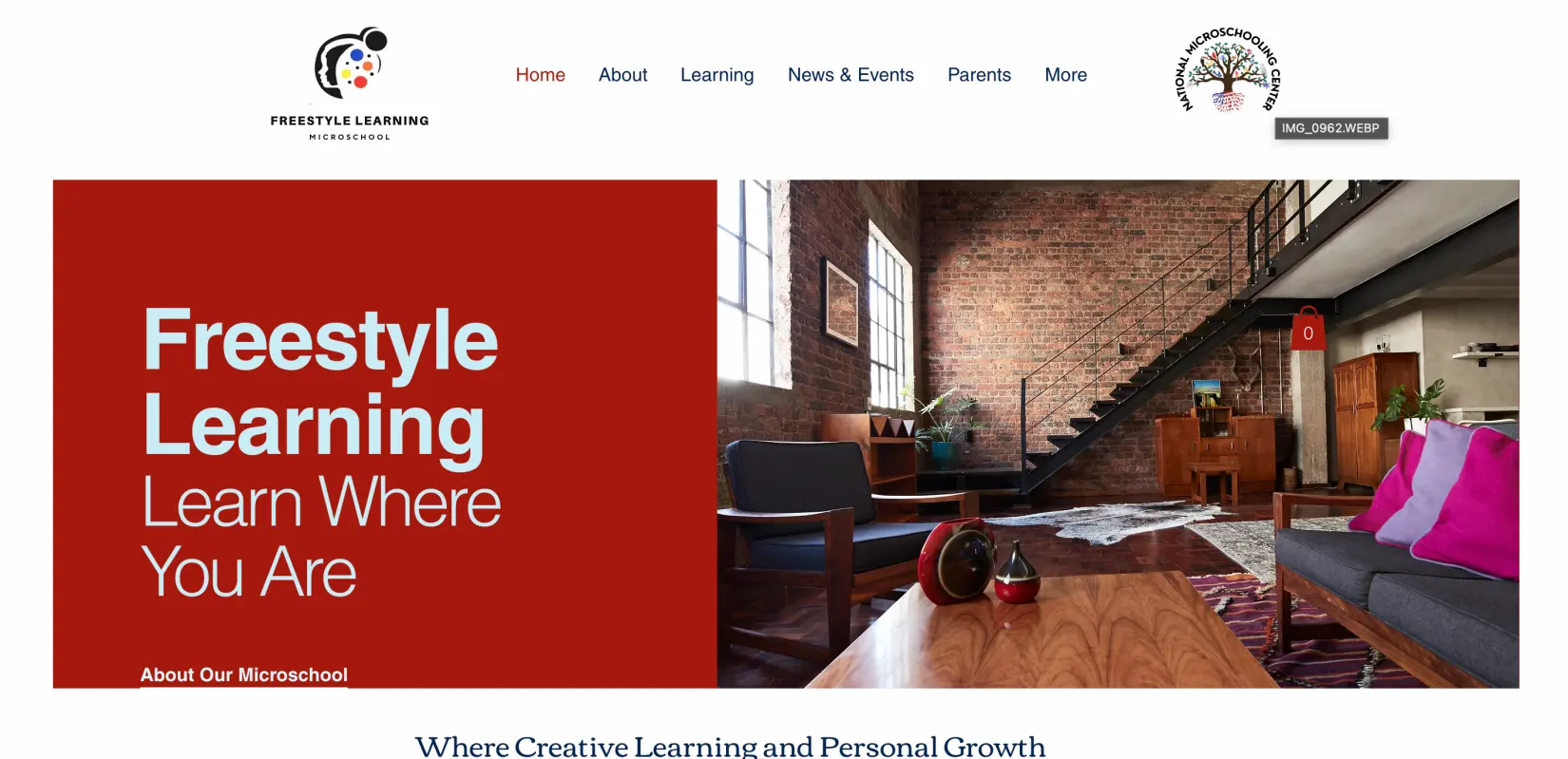
Freestyle Learning is a microschool located in the South Suburbs of Chicago, Illinois, recognized by The National Microschooling Center. Founded by LaTrece Thomas, it provides a unique educational approach, offering personalized and creative learning experiences to cultivate students' strengths and goals.
Educational Philosophy
Freestyle Learning supports homeschooled families and offers various services, including homeschooling resources, after-school homework assistance, and academic workshops in subjects like writing, reading, science, and art. The curriculum includes social-emotional learning, language arts, math, science, history, and optional Bible studies, based on state standards. Freestyle Learning's mission is to focus on educating the whole person and reaching their academic goals through a multi-faceted, data-driven approach combining online and in-person element
What makes Freestyle Learning Microschool stand out
Personalized and Creative Learning: Freestyle Learning provides a tailored learning experience that focuses on cultivating each student's strengths and helping them reach their goals. This personalized approach is particularly beneficial for homeschooling families, offering a safe drop-off location for their children.
Comprehensive Curriculum: The school offers a wide range of classes, including Language Arts, Poetry, Writing, Reading, S.T.E.A.M., English, History, Geography, Mathematics, P.E., Art, Music, and more. This comprehensive curriculum ensures a well-rounded education for students.
Mastery-Based Learning: The school believes in mastery-based learning, where students must demonstrate their understanding before moving on to new topics. This approach, combined with growth mindset exercises, provides a supportive environment for learners to succeed.
Welcoming and Comfortable School Setting: Freestyle Learning prides itself on creating a relaxed environment with flexible seating arrangements, holistic aromas, and brain-boosting techniques, offering a comfort level that traditional schools may not provide.
Smaller Class Sizes: With smaller class sizes, the school offers a conducive learning environment with opportunities for one-on-one instruction and group activities in a small-group setting.
Focus on The Whole Child: The school's philosophy is to work on the whole child, aiming to develop them mentally, physically, spiritually, and academically. This approach helps reignite a child's love for learning that may have been dimmed in traditional school settings.
Testing and Assessments: Understanding the intensity of testing for children, the school spreads assessments across the academic year to ensure comprehension of material in a supportive environment. Standardized Testing is offered upon parents' request.
Online Class Options: Freestyle Learning also offers online classes, providing children with the opportunity to connect with peers and join onsite music and gym sessions.
Early Childhood Education: The preschool and kindergarten programs at Freestyle Learning go beyond childcare, integrating crafts, developmental abilities, and centers that keep students stimulated and eager to learn.


